|
Advantech ARK-1388 Box PC
Compact, rugged, fanless in-vehicle box PC brings Intel Core 2 Duo power and 3G voice/data communication for location-based integration projects
(by Conrad H. Blickenstorfer; photography by Carol Cotton)
With high-speed wireless data networks becoming increasingly available, we're seeing a great increase in in-vehicle computing solutions. These range from fleet and route management systems to all sorts of vehicle-based applications that communicate with backend servers. The computing hardware used for these systems is both similar and very different from commercial and consumer desktops and notebooks.
Among the special requirements for in-vehicle computers are compact size, superior reliability, immunity to shock and vibration, a very high operating temperature range, and enough overall ruggedness to withstand the day-to-day punishment of operation in a vehicle. Another requirement is the ability to run on a wide range of vehicle power voltage, including operation during cold cranking. Startup and shutdown of the computer must be linked to the car battery and ignition status. Performance, features and interface connectivity, however, must comply with common industry standards.
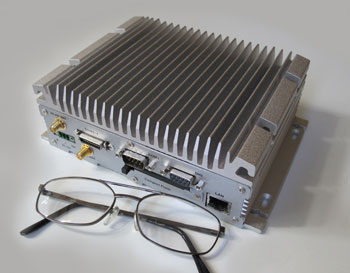 The Advantech ARK-1388, shown to the right, is a system designed specifically for applications that require reliable computing power in a compact, sturdy housing that'll fit in even the tightest places. The ARK-1388 measures about 6.0 x 5.5 inches and is 2.5 inches tall. I placed a pair of glasses in the picture to illustrate just how compact the ARK-1388 is.
The Advantech ARK-1388, shown to the right, is a system designed specifically for applications that require reliable computing power in a compact, sturdy housing that'll fit in even the tightest places. The ARK-1388 measures about 6.0 x 5.5 inches and is 2.5 inches tall. I placed a pair of glasses in the picture to illustrate just how compact the ARK-1388 is.
Weight is not generally much of an issue in a vehicle-mounted system. The computer weighs four pounds, with a full half of it accounted for by the precisely machine aluminum top that serves as a massive heatsink. Beneath the heatsink is another precision-machined adapter plate covered with soft thermal conductor putty material where the heatsink presses against chips and circuits that need cooling.
The elaborate heatsink design is necessary because the ARK-1388 does not have, or need, a fan despite the considerable computing power it provides. Despite its diminutive size, this rugged in-vehicle computer packs full Intel Core 2 Duo power in the form of a 1.06GHz U7500 processor. That's the same workhorse chip found in a number of industrial Tablet PCs and rugged notebook computers.
The image below shows the top view and all four side views of the ARK-1388. The housing is all-aluminum and feels exceedingly solid. Despite the low-voltage U7500 processor's very low Thermal Design Power of just 10 watt, the housing is essentially designed as one large heatsink to facilitate fanless (and thus silent and more reliable) operation. Note the clean and purposeful design and execution that facilitates easy integration as well as painless maintenance.
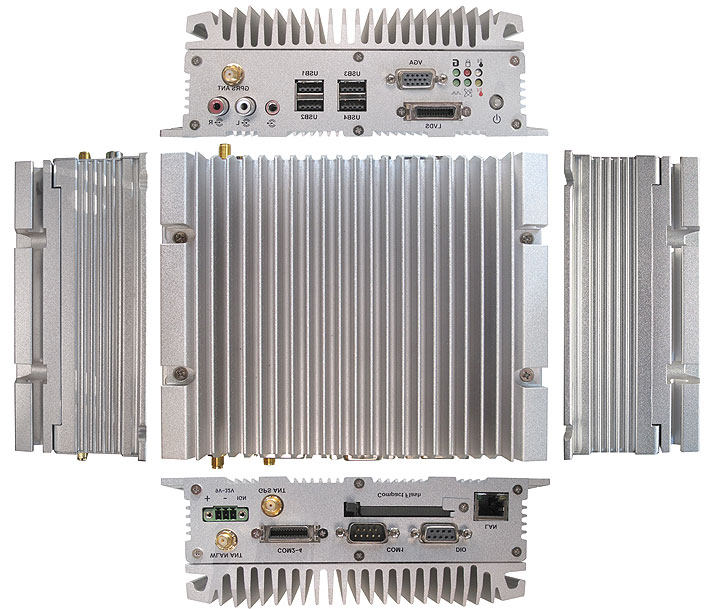
In terms of functionality and connectivity, this little Advantech box PC can accommodate most vehicular project requirements. The ARK-1388 is configured to offer the following external ports:
- 4 x USB 2.0
- 1 x Serial RS232
- 3 x Serial RS232/422/485 (COM2-4 ports selectable by jumper)
- Digital IO
- RJ-45 gigabit LAN
- Antenna WWAN
- Antenna GPRS
- Antenna GPS
- Power (9 to 32 Volt DC; minimum 6VDC cold crank)
- VGA video
- LVDS 36-bit
- Speaker left and right (there's a 6-watt amplifier)
- Microphone
The ARK-1388 is designed to run off solid state storage medium via an externally accessible CompactFlash card slot. Our review unit ran Windows XP Embedded on a 4GB Advantech industrial grade SQFlash card. The unit was configured with a gigabyte of PC2-5300 CL5 RAM 2GB of SDRAM.
Benchmark results were right up there with high performance mobile systems, though the flash-based XP Embedded configuration is, of course, tuned for specific applications as opposed to general purpose computing.
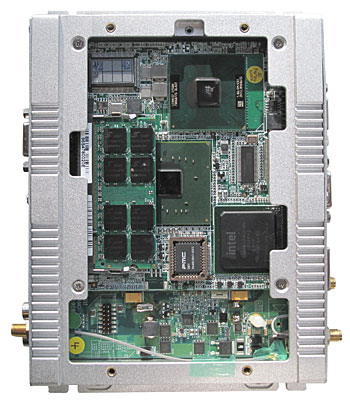 The inside of the ARK-1388 is easily accessible by removing the heatsink top of the unit that is held down by four small Philips screws. This reveals the ARK-1388's CPU module and carrier board and also provides access to the SODIMM memory slot. The inside of the ARK-1388 is easily accessible by removing the heatsink top of the unit that is held down by four small Philips screws. This reveals the ARK-1388's CPU module and carrier board and also provides access to the SODIMM memory slot.
In terms of ruggedness, the requirements for a boxed PC are different than those of a mobile computer. The housing is tough and very sturdy, and designed to handle the kind of shocks and vibration that may be encountered by fixed-mount system. Operating temperature is -4 to 131 degrees Fahrenheit for U7500-equipped units — a wide enough range to use this industrial PC almost anywhere — and the computer fulfills a long list of EMC and safety requirements. Sealing against water isn't much of an issue for units mounted inside a vehicle, and so there isn't any watersealing at the ports.
Note that the ARK-1388 can be configured for a wide variety of communication tasks. As a system that will primarily be used for location-based vehicular applications, the unit comes with an integrated 50-channel u-blox LEA 5 GPS receiver. You can also order the system with:
- an 802.11b/g WLAN miniPCI WiFi module
- a Wavecom Q2686 voice/data module that supports GSM/GPRS 850/900/1800/1900 MHz
- a Wavecom Q2687 that supports GSM/GPRS/EDGE
- a Siemens HC25 module for 3G UMTS/HSDPA
As you can see in the pictures above, the ARK-1388 has external antenna connectors for GPS, GPRS as well as WLAN.
What an ultra-compact in-vehicle box PC like the Advantech ARK-1388 offers is mainstream computing power and a wide variety of wireless connectivity in a small, very rugged package suitable for any number of systems integration projects.
-- Conrad H. Blickenstorfer
Advantech ARK-1388 Specs:
| Type |
Ultra-compact in-vehicle box IPC
|
| CPU Type |
1.06GHz Core 2 Duo U7500 (tested), or 1.06GHz Celeron M ULV 423
|
| Chipset |
Intel 945GM + ICH7-M
|
| BIOS |
Phoenix Award
|
| OS |
Windows XP Embedded (also supports other Microsoft operating systems)
|
| Memory |
Max 2GB DDR2 533/667MHz in 1 SDRAM 200-pin SODIMM socket |
| Graphics Controller |
Intel 945GM |
| Watchdog Timer |
255-level timer intervals, software setup |
| LVDS |
36-bit LVDS |
| LAN |
10/100 Mbps |
| SSD |
Compact flash type I/II slot
|
| Housing |
Aluminum with DIN-rail mounting; VESA mounting (desk/wall)
|
| Vibration |
With CF disk: 5 Grms, IEC 60068-2-64, random, 5 ~ 500 Hz, 1 Oct./min, 1hr/axis. / MIL-STD 514.5C-3
|
| Shock |
With CF disk: 50 Grms, IEC 60068-2-27, half sine, 11 ms duration. /MIL-STD 516.5
|
| EMC |
CE/FCC Class A, CCC, BSMI
|
| Safety |
UL, CCC, BSMI
|
| Vehicle |
ISO-7637-2
|
| Operating temperature |
U7500: -4 ~ 131° F; ULV423: -4 ~ 140° F
|
| USB |
4 x USB 2.0
|
| Serial |
1 x RS232, 3 x RS232/422/485 |
| Audio |
speakers left and right, Mic. |
| Communication |
Optional 802.11b/g miniPCI, optional Wavecom Q2686 (GSM/GPRS 850/900/1800/1900 MHz), optional Wavecom Q2687 (GSM/GPRS/EDGE), optional Siemens HC25 (UMTS/HSDPA) |
| GPS |
Integrated u-blox LEA 5 GPS receiver (supports 50 channels) |
| DIO |
Supports 8-bit Digital I/O |
| Size |
6.5" x 5.0" x 2.5"
|
| Weight |
4.0 lbs. |
| Power |
9 ~ 32VDC; typical power consumption 16 watts
|
| Price |
Starting at US$1,380 (with Intel Core 2 Duo U7500) |
| Datasheet |
Advantech ARK-1388 |
Advantech Corporation
38 Tesla, Suite 100
Irvine, CA 92618
Toll Free: 1-800-866-6008
Ph: 949-789-7178
Fax: 949-789-7179
ECGInfo@advantech.com
www.advantech.com
Advantech Co. Ltd.
No.1, Alley 20, Lane 26, Rueiguang Road
Neihu District, Taipei Taiwan 114, R.O.C.
Tel: 886-2-2792-7818
Fax: 886-2-2794-7301
www.advantech.com
|

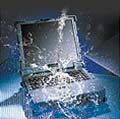

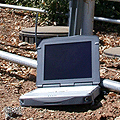

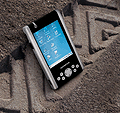
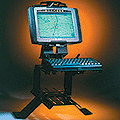





 The Advantech ARK-1388, shown to the right, is a system designed specifically for applications that require reliable computing power in a compact, sturdy housing that'll fit in even the tightest places. The ARK-1388 measures about 6.0 x 5.5 inches and is 2.5 inches tall. I placed a pair of glasses in the picture to illustrate just how compact the ARK-1388 is.
The Advantech ARK-1388, shown to the right, is a system designed specifically for applications that require reliable computing power in a compact, sturdy housing that'll fit in even the tightest places. The ARK-1388 measures about 6.0 x 5.5 inches and is 2.5 inches tall. I placed a pair of glasses in the picture to illustrate just how compact the ARK-1388 is.

 The inside of the ARK-1388 is easily accessible by removing the heatsink top of the unit that is held down by four small Philips screws. This reveals the ARK-1388's CPU module and carrier board and also provides access to the SODIMM memory slot.
The inside of the ARK-1388 is easily accessible by removing the heatsink top of the unit that is held down by four small Philips screws. This reveals the ARK-1388's CPU module and carrier board and also provides access to the SODIMM memory slot.